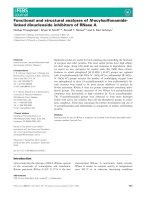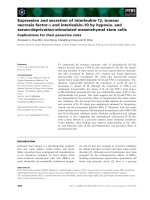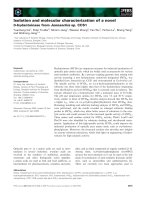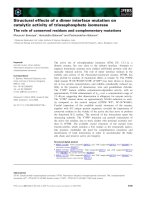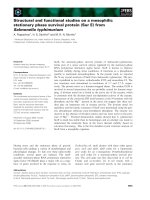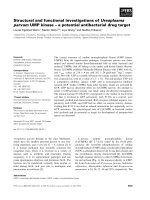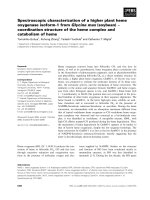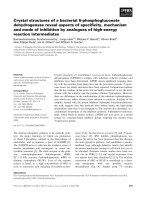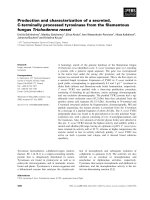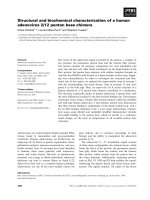Báo cáo khoa học: "Interlingua and MT, a Discussion" pptx
Bạn đang xem bản rút gọn của tài liệu. Xem và tải ngay bản đầy đủ của tài liệu tại đây (127.76 KB, 6 trang )
[
Mechanical Translation
, Vol.7, no.1, July 1962]
Interlingua and MT, a Discussion
by Jared Darlington *, Research Laboratory of Electronics,
Massachusetts Institute of Technology
This paper discusses a proposal by Alexander Gode that Interlingua be
used as an intermediate language for mechanical translation. The word-
by-word translations proposed by Gode from Interlingua into English
are not always easily understandable or editable, because of the presence
in Interlingua of idioms, reflexive verbs, multiple meanings for parti-
cles and other words, and non-English word-order. Some revisions in In-
terlingua are suggested which would make it more useful for mechanical
translation.
In the December, 1955, issue of MT, Dr. Alexander
Gode claims that “ a base text in Interlingua is
convertible by mechanical means into an editable trans-
lation in a target language belonging to the group of
languages which are summarized in Interlingua”.* This
“group of languages” includes primarily English,
French, Italian, Spanish and Portuguese, and second-
arily or derivatively Latin, Russian and German (vide
the Interlingua-English Dictionary, N. Y., Storm, 1951).
In the MT article, “mechanical” (i.e. word-by-word,
or rote) translations are made from a source text in
Interlingua into English, French and German. Though
the results of these translations are not correct or idio-
matic English, French or German, Gode believes them
good enough to permit an editor (presumably mono-
lingual) easily to transform them into correct, idio-
matic language. There is no doubt that the sample
translations which Gode presents are easily redactable,
but in one sense they are oversimplified in that only
one target-language equivalent is listed for each Inter-
lingual word. In a strictly rote translation, many pos-
sibilities must be listed for words like 'de,' 'per,' and
'que,' and in translating these words respectively as 'of,'
'by,' and 'which,' Gode does not explain why he
chooses these in preference to other possibilities like
'from,' 'through,' and 'that.' A program for the auto-
matic englishing of Interlingua must either list all the
English equivalents of each Interlingual word it en-
counters, or it must be able to decide, on the basis of
contextual hints, which translation is most appropriate.
That it will not suffice to proceed in an entirely word-
by-word fashion, listing all entries for each word, may
be readily seen by considering the following rote trans-
lation of an Interlingual sentence:
AT/TO + LESS + THAN/THAT/WHAT/WHICH/WHO/
WHOM + THE + GREAT + POWERS + WANT/WANTS/
WISH/WISHES + TO SAY/TO TELL + IT + THAN/THAT/
WHAT/ WHICH/ WHO/ WHOM + THEM/ THEY + SAY/ SAYS/
* This work was supported in part by the National Science Founda-
tion and in part by the U.S. Army Signal Corps, the Air Force Office
of Scientific Research, and the Office of Naval Research.
* Gode, Alexander, “Signal System in Interlingua,” Mechanical
Translation, Vol. 2, No. 3, p. 90 (1955).
2
TELL/TELLS + ABOUT/ABOVE/CONCERNING/ON/ON TOP/
ON TOP OF/OVER/UPON + THE + ENDING/TO END/FIN-
ISHING/TO FINISH + BELONGING TO THE/BY MEANS OF
THE/FROM THE/MADE OF THE/OF THE/SINCE THE/WITH
THE + PROOFS/TESTS/TRIALS + NUCLEAR + , + MANY/
MUCH + COUNTRIES/LANDS + MORE/PLUS + LITTLE/
SMALL + HERSELF/ HIMSELF/ ITSELF/ ONESELF/ THEM-
SELVES + WILL + FRIGHTEN.
The Interlingual sentence that gives rise to this farrago
is:
A menos que le grande potentias vole dicer lo que
illes dice super le finir del provas nuclear, multe
paises plus parve se espaventara.
In plain English, this means:
Unless the great powers mean what they say about
the ending of nuclear tests, many smaller countries
will be frightened.
The almost total unintelligibility of the sample rote
translation is due to the many idiosyncrasies of Inter-
lingua that are present in the original sentence. Among
these are: the idiomatic nature of 'a menos que' ('un-
less'), 'vole dicer' ('mean'), and 'lo que' (relative pro-
noun 'that which' or 'what'); the reflexive nature of
the verb 'se espaventar' ('to become frightened'); the
multiple uses of the prepositions 'a,' 'de,' and 'super;'
the substantive nature of 'finir,' requiring the English
gerundial 'ending' (or 'finishing'); and the nonexist-
ence of personal and numerical forms for the Interlin-
gual verbs. Less serious are the departure from Eng-
lish word-order in 'provas nuclear' and 'paises plus
parve,' and the multiple entries for 'provas,' 'multe,'
'paises,' 'plus,' and 'parve.'
The possibility of finding or constructing troublesome
Interlingual sentences of this sort entails of course
that this language as it stands is not a satisfactory
source-language for rote translation into English. In
this paper we propose to examine the idiosyncratic
features of Interlingua in a little more detail, and to
try to see what can be done about them. Since Inter-
lingua is to some extent an artificially constructed lan-
guage, there is always the possibility of modifying it
so as to eliminate various difficulties that crop up, an
alternative that most definitely is not open in dealing
with natural languages. For Interlingua too there is a
limit, albeit vaguely defined, to the amount of permis-
sible tampering, namely, Interlingua must not be made
so like one of the contributing natural languages that
it becomes too unlike one or more of the others. That
is, its character as the “least common denominator” or
“intersection” of the important western European lan-
guages must in some sense be preserved. In making
Interlingua more “logical” so as to facilitate mechanical
translation out of it, we must not make it so “unnatural”
that it cannot easily be read by people with a “stand-
ard average European” (in Whorf's sense) linguistic
background.
Turning our attention next to the idioms* of Inter-
lingua, we may divide them roughly into six cate-
gories: †
1. Idioms which can be literally translated into English
with no loss of original meaning (strictly speaking,
these interlinguicisms are not idiomatic with respect
to English), such as:
a. abundar in = to abound in
b. cader malade = to fall ill
c. esser curte de = to be short of
d. esser tote aures = to be all ears
e. in le calor de = in the heat of
f. in le ultime analyse = in the final analysis
g. justo nunc = just now
h. sin dubita = without doubt
2. Idioms which can be literally translated into English,
making only minor changes, with no loss of original
meaning, such as:
a. calefaction central = central heating
b. critar al lupo = to cry wolf
c. de tote lateres = on all sides
d. esser de accordo = to be in accord
e. fortia brute = brute force
f. jocar de parolas = to play on words
g. lassar multo a desirar = to leave much to be
desired
h. loco commun = commonplace
3. Idioms which, if literally translated, make sense
but the wrong sense, such as:
* The following is a representative selection, rather than a com-
plete listing, of Interlingual idioms. The sources for them, as well
as for the other features of Interlingua discussed, are the Interlingua
publications of Dr. A. Gode and associates, especially the Interlingua-
English Dictionary, the Interlingua grammar (both N.Y., Storm,
1951), and Novas de Interlingua.
† We are not presupposing any particular definition of 'idiom.' An
excellent discussion of the problem of defining this term may be
found in Dr. Bar-Hillel’s paper, “Idioms,” in W. N. Locke and
A. D. Booth, Machine Translation of Languages, N. Y., John Wiley
& Sons, Inc., 1955. Bar-Hillel rightly points out that a distinc-
tion must be drawn between monolingual and bilingual idioms, and
that no expression is ever idiomatic in an absolute sense, its idiomacy
being relative inter alia to a grammar and to a dictionary.
a. de bon corde = gladly, willingly, not of good heart
b. foras de se = beside oneself, not outside of one-
self
c. guardar le lecto = to stay in bed, not to guard
the bed
d. voler dicer = to mean, not to want to say
4. Idioms which, if literally translated making only
minor changes, make sense but the wrong sense, such
as:
a. a fortia de = by means of, not necessarily by
force of
b. manducar le parolas = to mumble, not to eat
one’s words
c. societate anonyme = limited company, not anony-
mous society
5. Idioms which can be literally translated, but which
have some English meanings that are not correct, such
as:
a. deponer un summa super un cosa = to put a sum
on something (i.e., to bet, not to make a down
payment)
b. esser in balancia = to be in balance (i.e., to be
undecided, not to be steady)
c. prender le aer = to take the air (i.e., to get some
fresh air, not to speak over the radio, or to leave)
6. Idioms whose literal translations are nonsensical,
such as:
a. a fin que = in order that
b. a menos que = unless
c. de hic a un hora = an hour from now
d. experto contabile = accountant
e. haber loco = to take place
f. il conveni de facer le = it is advisable to do it
g. il se tracta de = it is a matter of
h. le unes le alteres = each other
Various proposals have been made for handling
idioms in mechanical translation, and they often involve
using a special idiom dictionary (vide Bar-Hillel, op.
cit.). But there are two main difficulties in the use of
an idiom dictionary, namely, (1) the existence of dis-
continuous idioms, as in 'The Count di Luna got, or so
he thought, his own back,' and (2) the fact that cer-
tain expressions are sometimes idiomatic, sometimes
not, as in 'In truth, he has lost his faith.' Mechanical
means of handling discontinuous idioms and sometime-
idioms are not in principle impossible to devise, but it
would certainly be simpler if the source-language con-
tained some further indications of the presence of
idioms. As far as Interlingua is concerned, we may
simply stipulate that no idioms are to be discontinuous,
and further that all the words making up an idiom are
to be connected either by hyphens (as in the English
'to-day' and 'week-end') or by outright compounding
(as in 'today' and 'weekend'). Thus, in Interlingua, we
will get hyphenated expressions such as 'a-menos-que'
3
('unless'), 'il-se-tracta-de' ('it is a matter of'), and 'a-
fin-que' ('in order that'), or compound words, such as
'amenosque,' 'ilsetractade,' and 'afinque.' The ease of
reading should be the crucial factor in deciding whether
these idioms should occur as hyphenated or as com-
pounded. For a rote translation routine, all that mat-
ters is that they not consist of words separated by
spaces. The Interlingua dictionary will have to include
these hyphenated or compounded idioms. Thus, the
original writer of an Interlingual article or summary
will do a certain amount of automatic “pre-editing” of
his own work.
Turning our attention next to the reflexive verbs of
Interlingua, we note that several of these do admit of
a literal translation into English. For example:
a. assecurar se que = to assure oneself that
b. blandir se = to flatter oneself
c. contentar se con = to content oneself with
Others yield wrong meanings under literal translations:
a. affliger se = to grieve, not to afflict oneself
b. batter se = to fight, not to beat oneself
c. espaventar se = to become frightened, not to
frighten oneself
d. facer se tarde = to be late, not to make oneself
late (being late is not always one's own fault)
e. occupar se de = to be interested in, not to occupy
oneself of
Still others yield no sensible literal translations:
a. addormir se = to fall asleep
b. affollar se = to get angry
c. amicar se = to make friends
d. debatter se = to argue
e. obstinar se a = to persist in
f. sentir se ben = to feel well
It would obviously simplify matters if the reflexive
pronoun 'se' were always connected to the verb, by an
apostrophe or by a hyphen. Thus, instead of 'ille se
batte' we would have 'ille s'batte,' or 'ille se-batte.'
Then, the correct translation 'he fights' would always
result, and there would be no chance of ever getting
the malapropos 'he beats himself.'
As for the prepositions and other grammatical words
of Interlingua the main trouble is that one word is
frequently used to signify several essentially different
relations or concepts. The preposition 'de' is perhaps
the worst offender, but is by no means the only one,
some other culprits being:
per = by, by means of, during, per, through,
throughout
perque = because, why
post = after, afterwards, back, backwards, behind
super = about, above, concerning, on, on top, on top
of, over, upon.
The problems caused by the multiple entries for these
and other grammatical words are compounded by the
4
fact that one word may perform several different syn-
tactical feats, e.g., 'post' may be either an adverb or a
preposition; 'perque' may be either an adverb or a con-
junction; 'omne' may be either an adjective or a pro-
noun; 'ancora' may be either an adverb or an inter
jection; 'alique' may be either an adverb or a pronoun
'que' may be either a conjunction, an interrogative
pronoun, or a relative pronoun; 'bastante' may be either
an adjective or an adverb; and so it goes. There is also
in many cases a confusion between a spatial and a
temporal sense, as in 'ante,' which as a preposition can
mean either 'in front of (in space) or 'before' (in time)
and which as an adverb can mean either 'ahead' (in
space) or 'earlier' (in time). In a case like this, one
might conceivably argue that there is no important
difference among these four senses, and that Interlingua
is quite right to summarize them all in one word. On
the other hand, some of the “contributing languages”
do distinguish between two or among three or four of
these senses. The English 'before' can, with a little
good will, be used in all senses except the spatial ad-
verbial. In Italian, though a rigorous division is main-
tained among 'davanti a' (sp. prep.), 'prima di' (temp.
prep.), 'avanti' (sp. adv.), and 'prima' (temp. adv.).
In the englishing or italianating of Interlingua, then,
the clues for the correct translation of 'ante' must be
gleaned from the syntactical structure of the sentence
and from the semantical context of the discussion. The
former sort of clue should tell whether 'ante' is an ad-
verb or a preposition; the latter sort should tell whether
it is used spatially or temporally. This kind of analysis
could be avoided altogether, for 'ante' anyway, if In-
terlingua itself used four different words instead of the
single word 'ante.' The Italian words might profit-
ably be taken over here by Interlingua, with the in-
sertion of a hyphen in 'prima di' so that it becomes
'prima-di' (or 'prima-de'), and with the elimination of
the unattached 'a' of 'davanti a.' Just as it simplifies
the interpretation of idioms and reflexive verbs to hy-
phenate or otherwise to agglutinate them, there is no
logical reason why an adverb or a preposition should
consist of several disconnected words. English, inci-
dentally, is not entirely free of such illogicalities. We
say 'near the barn,' but 'far from the barn;' 'behind
the table,' but 'in front of the table.' In treading among
the Interlingual particle system in search of ways to
improve the language's rote translativity, we must of
course awaken no more sleeping dogs than necessary.
To some extent, the asseveration that Interlingua can
serve as an intermediate language conflicts with the
more frequent claim that it is an easily read and easily
learned auxiliary tongue. If we attempt to make it more
logical, we may in so doing render it less readily com-
prehensible. (A good example of this is the artificial
language “Loglan” of James Cooke Brown, as described
in his article, “Loglan,” Scientific American, June,
1960). The modifications of Interlingua that we suggest
are not in toto so far-reaching that they should make it
harder to read or to learn. It may be more of a bore to
learn four words than one, as in the case of 'ante,' but
the precise indication of idioms and reflexive verbs
should if anything make the language easier to read.
Generally speaking, any modification that improves its
rote translativity should also improve its legibility, for
the reason that we ordinarily read a foreign language
not perfectly familiar to us in a word-by-word fashion
anyway. Only when we get bogged down in our word-
by-word scanning do we contemplate the possible pre-
sence of idioms, reflexive verbs, multiple meanings, and
what not.
In revising the Interlingual particle system we should
be guided by the general principle that two or more
“important” (a hard word to define in this context)
senses should not be confounded in the same word.
Pragmatically, a distinction may be considered “im-
portant” if it is drawn in one or more of the “con-
tributing languages” into which we would like to trans-
late. Some of the “important” distinctions, then, will be
spatial v. temporal, adverbial v. prepositional, adver-
bial v. adjectival, and other distinctions between parts
of speech. (If we were devising a more rigorously logi-
cal artificial language, we might decide that some of
these distinctions were unnecessary.) Others will be
distinctions among various spatial relations, e.g. above
v. below, and among various temporal relations, e.g.
before v. after. It will not be necessary withal to dis-
tinguish two meanings of 'or,' the inclusive and the
exclusive, corresponding to the Latin 'vel' and 'aut,'
since of the contributing languages only Latin insists
on this, and few if any people are interested in the
mechanical latinisation of Interlingua.
With the foregoing remarks in mind, we may next
consider some of the more confounding Interlingual
particles, and perhaps revise or restrict their meaning
to some extent.
The primary meaning of the preposition 'de' is 'of,'
in the sense of 'belonging to' or 'pertaining to.' Hence,
we may restrict 'de' to this one sense, and use other
words for the other senses, as follows:
belonging (or pertaining) to = de
by means of = per-medio-de
from = ab
made of = fato-de
since (temp. prep.) = desde
with = con
The prime meaning of 'super' is the spatial preposition
'over.' Thus, we have:
about (i.e. anent) = re
above (sp. adv.) = in-alto
concerning = re
on (sp. prep.) = sur
on top (of) = sur
over (sp. prep.) = super
upon (sp. prep.) = sur
The word 'que' occurs in at least two idioms, 'a-menos-
que' ('unless') and 'lo-que' ('that which'). These will
cause no trouble so long as they are hyphenated or
compounded. Outside of these contexts its primary
sense is the relative pronoun and conjunction 'that.'
Thus, we have:
than (comp) = che
that (rel. pron., conj.) = que
that which = lo-que
what (interr. pron.) = qual
what? = come?
which (interr. pron.) = qual
who (rel. pron.) = qui
who (interr. pron.) = chi
who? = chi?
whom = chi
We may analyse 'per' as follows:
by (for passive constructions) = per
by means of = per-medio-de
during = durante
for = pro
through (sp. prep.) = a-transverso-de*
through (sp. adv.) = a-transverso
throughout (temp. prep.) = durante
Compounds of 'per,' 'pro,' and 'que' include 'perque'
and 'proque.' To avoid ambiguity, we suggest using
'perque' in the sense of 'because' and 'proque' in the
sense of 'why?'
We may analyse 'si' as follows:
if = si
so (adv.) = sic
so (comp.) = cosi
yes = oui
For 'como,' we have:
as = como
how? = come?
what? = come?
For 'isto:'
this (pron.) = isto
this (dem. adj.) = iste
these (pron.) = istos
these (dem. adj.) = istes
For 'omne:'
all (adj.) = omne
all (pron.) = totes
all the world = toto-le-mundo
each = ogni
everyone = totos, tutti
everything = toto, tutto
* There is no exact interlinguicism for 'through' in the context of
such phrasal verbs as 'to see it through' and 'to muddle through.'
These and similar phenomena are essentially local from the point
of view of “standard average European”, they do not belong to
the “intersection” of the important western European languages, and
their meaning is only very roughly approximated in Interlingua.
5
To make any changes in Interlingua other than of the
foregoing sort would probably be to pass the point of
diminishing returns. For an infinitive like 'finir' in our
earlier example, which could theoretically be trans-
lated into English either as an infinitive or as a substan-
tive, it should not be necessary to add a separate ger-
undial form to Interlingua. We may reasonably suppose
that a recognition routine could be devised for Inter-
lingua that could tell when 'finir' is used verbally and
when it is used substantively. In our example, the fact
that 'finir' is immediately preceded by the definite ar-
ticle 'le' is sufficient indication that it is used as a noun.
It would moreover be a shame to damage the verbal
simplicity of Interlingua by bringing conjugations back
in, and mechanical translation out of Interlingua does
not require this. In our example, person and number
for all verbs are sufficiently indicated by their directly
preceding nouns or pronouns; 'grande potentias,' 'illes,'
and 'paises plus parve' all require a third-person-
plural form. Finally, we shall propose no changes in
the word order of Interlingua, nor any routine that
automatically rearranges the words into a more Eng-
lish pattern. English and Interlingual word-orders are
sufficiently alike so that their differences alone should
not interfere with the easy editability of a rote trans-
lation, and it would moreover be difficult to devise a
rule, for example, that would be entirely correct for the
order of nouns and adjectives. The normal Interlingual
adjectival position is after the noun, but there are
plenty of exceptions, and the usual English scheme of
adjective followed by noun is likewise exceptionary.
We shall be satisfied if we can produce a readily re-
dactable translation of an Interlingual text, and we
suggest that this is possible, assuming that some
changes of the above sort are made in Interlingua. Let
us examine this proposition in terms of our earlier ex-
ample. According to our suggestions, it will have to be
rewritten as follows:
A-menos-que le grande potentias vole-dicer lo-que
illes dice re le finir del provas nuclear, multe paises
plus parve s'espaventara.
If we assume the existence of a routine sagacious
enough to recognise that all the verbs are third-person-
plural, that 'illes' is 'they' rather than 'them;' that 'finir'
is substantive, and that 'paises' requires 'many' rather
than 'much,' a rote translation of the passage yields:
UNLESS + THE + GREAT + POWERS + MEAN + WHAT +
THEY + SAY/TELL + ABOUT + THE + ENDING/FINISH-
ING + OF + THE + PROOFS/TESTS/TRIALS + NUCLEAR
+
, + MANY + COUNTRIES/LANDS + MORE/PLUS +
LITTLE/SMALL + WILL + BE + FRIGHTENED.
The only multiple choices that remain are those for
'dice,' 'finir,' 'provas,' 'paises,' 'plus,' and 'parve.' In
each case here it is a matter of choosing between or
among words that are more or less synonymous, and it
is probably not wise to try to eliminate these choices.
To list just one choice in each case would be arbitrary,
6
and to decide between or among them mechanically
would require an extremely sophisticated routine. If
all the editor has to do, is to make choices of this sort
and to make some minor changes in word-order, we
may safely say that the translation is “easily editable.”
We may next assay the translation of two Interlingual
sentences taken from actual texts, for each giving (1)
the original Interlingual passage, (2) the revised In-
terlingual passage, (3) the rote translation of (2), and
(4) a correct idiomatic English translation.
1. De un latere esseva le latinistas traditional qui se
monstrava preoccupate del problema de revitalisar
le studios classic . . . (Novas de Interlingua, Vol.
3, No. 1, Jan-Feb., 1958, pp. 1-2).
2. De-un-latere esseva le latinistas traditional qui se
monstrava preoccupate per le problema de revitali-
sar le studios-classic . . .
3. On one side were the latinists traditional who
showed themselves preoccupied by the problem of
revitalising the classical studies . . .
4. On one side there were the traditional latinists who
were preoccupied with the problem of revitalising
classical studies . . .
In this example, the hyphenating of the idiomatic
and reflexive constructions 'de-un-latere,' 'se-monstrava',
and 'studios-classic' substantially improves their rote
translativity. The transition from (2) to (3) presupposes
moreover a routine that can recognize the plural inten-
tion of 'esseva' and 'se-monstrava' (the sole clue for
which is the plural ending of 'latinistas'), that can
recognize the nominative intention of 'qui,' and that
can recognize the gerundial intention of 'revitalisar.'
In rewriting the original passage (1) it was also neces-
sary to replace 'del' with 'per le,' so that the meaning
'by the' would unambiguously come forth (some edi-
tors would no doubt prefer to change 'by' to 'with' in
the final redaction, as we have done).
Our second example is:
1. De tempore a tempore, e a intervallos progressive-
mente decrescente, nos ha trovate nos embarassate
per le requesta de recommendar un bon summario
historic e actual del problema del communication
translingual e de su possibile (o imaginabile) solu-
tiones (Novas de Interlingua, Vol. 3, No. 3, May-
June, 1958, p. 1).
2. De-tempore-a-tempore, e a intervallos progressive-
mente decrescente, nos ha trovate-nos embarassate
per le requesta de recommendar un bon summario
historic e contemporanee del problema del communi-
cation translingual e de su possibile (o imaginabile)
solutiones.
3. From time to time, and at intervals progressively
decreasing, we have been embarrassed by the re-
quest of to recommend a good summary historical
and contemporary of the problem of the communi-
cation translingual and of her/his/its possible (or
imaginable) solutions
.
4. From time to time, and at progressively decreasing
intervals, we have been embarrassed by the request
to recommend a good historical and contemporary
summary of the translingual communication prob-
lem and of its possible (or imaginable) solutions.
In going from (1) to (2) we treat 'de-tempore-a-tem-
pore' and 'trovate-nos' as idioms. A routine that can
recognize the nominative intention of 'nos' is presup-
posed. The adjective 'actual' has too many different
English meanings, and is replaced by the more pre-
cise 'contemporary' (or 'contemporanee'). The only
multiple choice word that remains is 'su,' and we'll
not assume a routine sapientipotent enough to choose
among 'her,' 'his,' and 'its' in all contexts.
The final question we shall raise is, just how import-
ant is it to translate from Interlingua into English or
other natural languages? At present most of the journ-
als that use Interlingua are written primarily in Eng-
lish, and use Interlingua only for summaries. There
are only two journals, Spectroscopia Molecular and
Novas de Interlingua, written exclusive in Interlingua,
and there are several non-English medical journals that
use Interlingua for summaries. These latter include
Giornale Italiano di Chemioterarpia, Haematologica
Polonica, Revista Cubana de Cardiologia, and Archivos
Peruanos de Patologia y Clinica. If the number of non-
English journals using Interlingua were to increase
severalfold, and if Interlingua were to prove not read-
ily legible by monolingual English speakers (there is
some evidence that this is the case), then there would
be some advantage in translating it efficiently and per-
haps mechanically into English. More useful of course,
would be a program that translated mechanically from
English into Interlingua, or even that produced Inter-
lingual summaries of English articles. But it is un-
fortunately not much simpler in principle to translate
mechanically from English into Interlingua than into
French or Italian, since the primary problem in each
case is the unsolved one of automatically recognizing
the syntactic and semantic structure of the English
sentence. Received April 1, 1961
7
